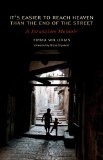Summary | Excerpt | Reviews | Beyond the Book | Readalikes | Genres & Themes | Author Bio

A Jerusalem Memoir
by Emma Williams
Driving back to Jerusalem, I wondered about Ghassan. About
him seeing the concrete wall towering between him and the short
distance to his wife and toddling son, about him applying for a
permit to be allowed to see the two of them, about his ordeal of
waiting and humiliation. General Gilad had been in earnest when
he said that half the checkpoints had been removed and that the
Barrier would make life better for Palestinians inside it because
there would be fewer checkpoints. Inside. And did he know the
number of internal checkpoints had not decreased, nor leveled off,
but had actually increased?
The bubble again, hiding from hearing the prejudices: people
saying the word “Palestinian” and meaning terrorist, the word “Jew”
and being full of hate. People who hadn’t seen, or didn’t want to
know, or if they had been here, seeing out of one eye. And in a way
I envied them their one-eyed view; simple, straightforward, knowing
where you stand, stark in black and white, all sorted out, not torn.
But one-eyed views didn’t fix: I had stood at a party abroad holding
a glass of wine and listened to foreign male certainty brush aside the
things I’d seen, imposing their distant diagnoses, and I had hurried
back to Jerusalem to listen to old hands who had watched for years,
decades, and who admitted they had no answers and were still able
to see the humanity of both sides.
I thought of trenches I had seen dug and closures tightened
even as the IDF announced that closures were being eased; of
conversations with foreign military observers who said time and
again that the upper tiers of the army didn’t know what the unit
commanders and ranks were doing; of Israeli friends’ shock at the
finding that, even in the first few days of the Intifada, unit
commanders made decisions without asking senior officers who
would have said no, and then there were riots, and people—their
own citizens, Palestinian Israelis—were killed.
I remembered the face of an Israeli friend, drained into anguish
waiting for her soldier son to come home, then silently putting
him to sleep in his boyhood bed—only he still is a boy, just eighteen—
and she’s wondering if she should look in his pockets to try
to understand what it is that he’s been doing on duty and won’t talk
about, just clams up. And the teacher, a settler, at my boys’ school
who wept in class for her baby niece shot dead by a Palestinian
gunman; and the other teachers telling her class of mostly
Palestinian children that she was weeping because she had a
headache.
I thought of the children shot dead by army snipers as they
played soccer or sat at their desks in school, their friends splattered
with their blood. Of the maze of lies, and the voices pushing from
abroad, the one dictating the “reality,” the other interpreting it for
their own use. And the voices on the ground, from both sides,
crying out for reason and moderation and understanding, and for
dialogue. The gags on those voices, the extremism, the blind
convictions and the willful misunderstanding. And of the many
Israeli peace activists, explaining to us whenever we saw them:
“People don’t know ‘the situation,’ because they are sold a version
and because of the ‘bubble.’”
I thought of the black-haired firebrand journalist, beating the
table at the smart East Jerusalem restaurant with her fists, her
bracelets crashing, saying, “The army and the settlers hit us again
and again and again and here and here and here and take our land
and break our trees and kill our kids day after day after day and
then ‘BOOM’ and everyone is surprised?”
I thought of the hundreds of dead whose lives are cut, and the
maimed whose lives are ruined, and all Israelis and Palestinians
living in fear, even the general at the top. Everyone trapped,
wondering how to get out of the situation.The reality for so many:
that, as the journalist said, ‘it’s easier to reach heaven than the end
of the street.”
Excerpted from It's Easier to Reach Heaven Than the End of the Street by Emma Williams. Copyright © 2009 by Emma Williams. Excerpted by permission of Interlink Books. All rights reserved. No part of this excerpt may be reproduced or reprinted without permission in writing from the publisher.




Too often we enjoy the comfort of opinion without the discomfort of thought.
Click Here to find out who said this, as well as discovering other famous literary quotes!
Your guide toexceptional books
BookBrowse seeks out and recommends the best in contemporary fiction and nonfiction—books that not only engage and entertain but also deepen our understanding of ourselves and the world around us.